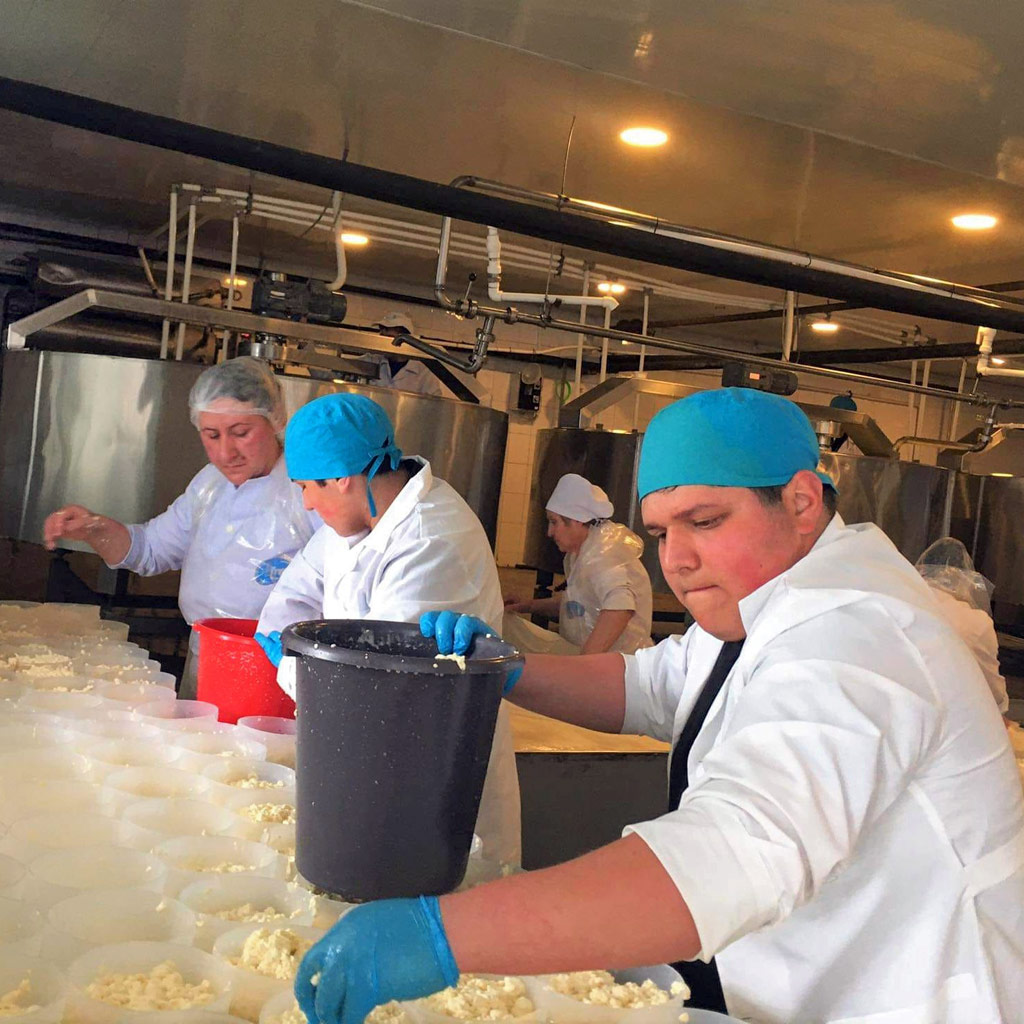Modernizing Vocational Education and Training in Agriculture in Armenia (MAVETA)
What do we see in the project photo?
Two aspiring dairy technologists (with blue caps) are working at Elola, a small commercial cheese processing plant in Verishen, southern Armenia. Under the supervision of staff, the two apprentices fill the moulds with cheese mass. The remaining whey will drip out, then the cheese is lightly pressed and placed in a salt bath. After the bath, the cheese ripens and becomes Chanakh, a typical Armenian soft cheese. Its flavour is salty, fresh, and slightly spicy. It is a regularly eaten everyday cheese, recommended to pair with fruit, vegetables, and white or red wines.
How would you explain to a child what the project is doing?
The best way to learn a profession is by working together with experienced professionals – this way you can acquire the relevant skills necessary to practise the profession. Until now, vocational training in Armenia was based only on theoretical training at vocational schools, which is very far removed from onsite business practices.
What is the project’s main objective?
The project establishes dual vocational training in Armenia for six professions in the agricultural value chain: farmer, dairy farmer, veterinary assistant, dairy technologist, agricultural machinery mechanic, and orchardist. Apprentices learn professional skills at business workplaces or on a farm, and their schoolteachers must take different working situations from the apprentices’ practical experiences and explain the theoretical reasoning for an activity. The vocational training courses last between two and a half to three years. The apprentices start their training aged anywhere between 15–24 years old (some are even older).
Why is the project important?
“Learning by doing” develops competencies to cope with work situations and links student education to the labour market. Apprentices are paid a salary while they work with the company or on the farm. These are the best prerequisites to finding a job after the training or building up their own businesses. In the long term, the project helps youths gain a perspective in their rural regions, strengthens the local economy, reduces poverty, and helps quell the flow of young people leaving to live in bigger cities.
What has been the most positive moment during the project?
Some milk processors, veterinarians and farmers are looking for apprentices and they are very motivated to employ and train them. Teachers start to build up practice- and activity-oriented lessons and reflect together on case studies from the students’ work.
What are the biggest challenges encountered in the project?
The political and economic conditions the country is facing are miserable, and many people have lost hope that their situation will change. Hygienic conditions in milk processing companies must be improved. Agricultural professions are not popular among youth. Different vocational education concepts must be translated from German into English and then into Armenian, which is a big challenge for acquiring new and innovative concepts.
What is the most important lesson learnt from the project?
Building trust between educational partners (companies and colleges) is crucial for the project to work. As climatic conditions in the Syunik and Lori regions of Armenia are comparable to those in Switzerland, case studies from Switzerland can strengthen this trust and the collaborations between the partners. Close guidance in follow-up processes is crucial, so that innovative ideas are implemented in a successful way.
About the project
Title:
Modernizing Vocational Education and Training in Agriculture in Armenia (MAVETA)
Contact:
Johannes Brunner, BFH-HAFL, Switzerland
Duration:
The first main phase of implementation runs from September 2022 until August 2025, with a total budget of CHF 8.3 million. The second main phase has already been approved, in principle, for the years 2026–2030.
Funding institutions:
The MAVETA project is funded by a broad coalition of international and local organisations led by the Swiss Agency for Development and Cooperation (SDC), including the Austrian Development Agency, the German Ministry for Economic Cooperation and Development (BMZ), the Government of Armenia, Swiss Church Aid (HEKS/EPER) NGO, Izmirlian Foundation, the Strategic Development Agency (SDA) NGO, and Vanand Agro CJSC.
Implementing institution:
The project’s implementing partners are the GIZ and HEKS/EPER, with the involvement of SDA and the School of Agricultural, Forest and Food Sciences at Bern University of Applied Sciences (BFH-HAFL).
Links to further information:
https://sda.am/projectportfolioeng/modernizing-vocational-education-and-training-in-agriculture-in-armenia-maveta/?lang=en
https://sda.am/homepageeng/vet-development-in-syunik-marz-2016-2020/?lang=en
https://www.bfh.ch/en/research/research-areas/hafl-hugo-p-cecchini-institute/projects/
https://www.bfh.ch/en/research/research-projects/2021-905-168-513/

